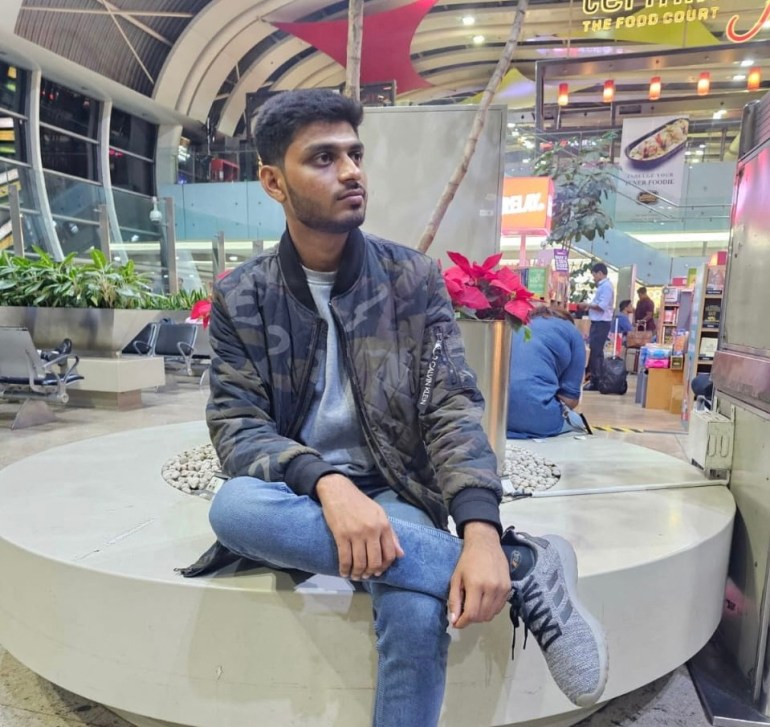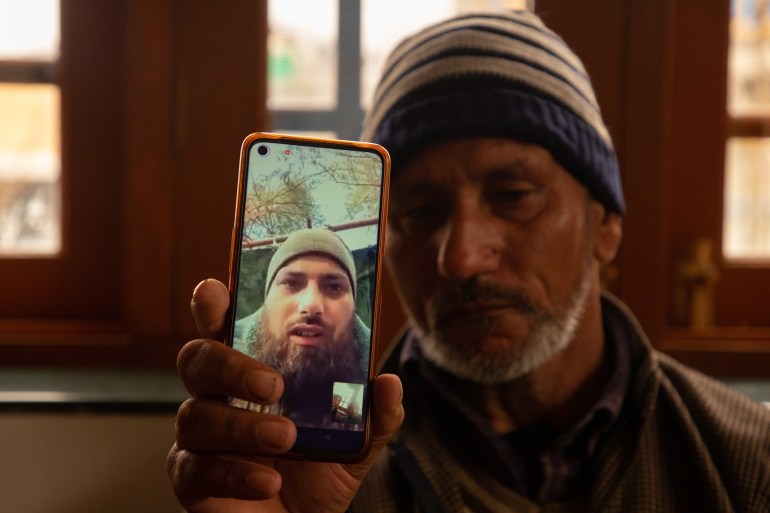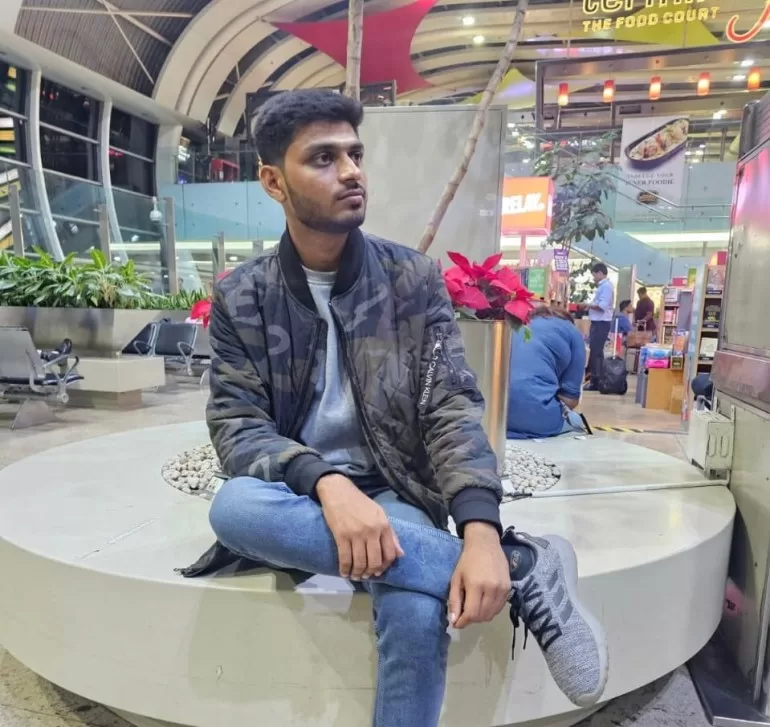Hemil, 23, said he had been eating well and had warm bedding. But the father knew he was trying to “hide his turmoil inside him”, he said. Hemil was on the front lines of Russia’s war on Ukraine, his role very different from the task of a Russian “army helper” that he had signed up for.
“That night, he didn’t want to hang up the call and was consumed by a deep longing for home,” Ashwin told Al Jazeera over the phone from his home in Surat city in India’s western state of Gujarat. The call lasted an hour.
It would be their last conversation.
Two days later, they received another call. It was not Hemil.
“Hemil has been killed in a missile strike,” said the man on the call in Hindi, identifying himself only as Imran from the southern Telangana state.
Imran told them the missile attack took place on February 21 – the day after Hemil’s call to his family – while he was digging a bunker.
“I felt like our world had come crashing down,” said Ashwin. He said Hemil’s shocked mother has been hospitalised several times since the news was broken to them. “She stopped eating and did not talk for days.”
Ashwin learned from Imran that three Indians had carried Hemil’s body in a truck to a military base. Beyond that, he said, he did not know the details surrounding his son’s death.

YouTube video to recruit
In early December, Hemil was offered a job as a helper in the Russian army and promised a monthly salary of $1,800, which appeared to be a passport to prosperity for a family dependent on a small textiles shop in Surat. That is where Hemil worked too, helping his father until the dream of a future abroad took hold.
Hemil’s parents, along with a dozen relatives, travelled to Mumbai on December 14 to see him off at the airport, where two people – a man and a woman – who claimed to be employees of the recruiting firm that hired Hemil, received them and assured them their son would be safe from any actual fighting.
Hemil’s family said he was first taken to Chennai city in India’s south from where he flew to Dubai and was finally sent to Russia. The entire process, they said, appeared genuine until he reached Russia and was forced to undergo arms training. He was then deployed to the front lines, tasked with digging bunkers and transporting heavy weapons for the Russian soldiers, said his father.
But Hemil is not the only Indian lured by online recruiters offering “army helper” jobs in Russia. The jobs were posted by ‘Baba Vlogs’, a YouTube channel with 300,000 subscribers and purportedly operated by a Dubai-based Faisal Khan.
The job video on the channel, shot on the streets of the Russian city of Saint Petersburg, was posted in October and has garnered more than 42,000 views since. It promises the prospect of Russian citizenship and the flexibility to relocate to any other European country after six months of service.
Al Jazeera reached out to Khan, the operator of the YouTube channel, but did not receive a response.
Ashwin said Hemil was coerced into paying a hefty commission of $3,600 to his recruiting agents – half transferred online and the remaining given to the agents he met at Mumbai airport. He said he had borrowed the money from his aunt.
Ashwin told Al Jazeera that Hemil “began expressing his desperation to leave” as soon as he landed and was made to join the war. “But there seemed to be no means of escape,” he said.
Ashwin wrote several emails to the Indian embassy in Russia and the Ministry of External Affairs in New Delhi, seeking their help in removing his son from the war. “Hemil might have been alive today if the government had helped on time,” he told Al Jazeera.
The Indian government last month admitted nearly 20 of its nationals are “stuck” in the Russian army and said it is trying for their early discharge and eventual return home.
Last week, ministry spokesman Randhir Jaiswal said action has also been initiated against “agents and unscrupulous elements who recruited” Indians on false pretexts and promises.
“The Central Bureau of Investigation yesterday [March 8] busted a major human trafficking network conducting searches in several cities and collecting incriminating materials. A case of human trafficking has been registered against several agents,” he told reporters, adding that people should not be swayed by offers for support jobs in the Russian army. “This is fraught with danger and risk to life.”
Last week, a video showing seven men in army fatigues, most of them from the northern states of Punjab and Haryana, went viral. In the video, one man from the group said they were visiting Russia to celebrate the New Year when they were deceived by an agent into fighting in the war. They said they were being compelled to fight on the front lines despite no knowledge of operating a gun as they appealed to the Indian government to help them.
Russia has been accused of hiring vulnerable unemployed men from India and other South Asian countries as combatants to fight its war with Ukraine. Al Jazeera has already reported about hundreds recruited from poverty-stricken Nepal, at least 12 of whom have died in the war.
Hemil is also not the only Indian to have lost his life fighting a foreign power’s war.
Muhammad Asfan, a 30-year-old man from the southern state of Telangana, also fell victim to the job fraud and tragically lost his life, the Indian embassy in Moscow announced on March 6, adding that efforts to repatriate his body to his native place are on.

‘They can be killed any time’
Azad Yusuf Kumar, 31, is from Pulwama district in northern Indian-administered Kashmir. His father and older brother earned their livelihoods by digging bore wells, but it did not pay enough for the family to earn a living.
Azad, a commerce graduate, went to Saudi Arabia where he worked for two years. But he returned home in 2021 to get married and decided to find a job nearby. But opportunities were limited in job-starved Kashmir, where the unemployment rate was 18.3 percent in 2023, according to the Indian government, much above the national average at 8 percent.
Azad started looking online and stumbled upon the same YouTube channel that Hemil and Asfan were duped by. In December, he left home, telling his family he had been selected as a cook in Dubai. It is unclear whether Azad lied to his family or was promised a job very different from the one he would end up having to do.
Within days after he had left India, Azad’s phone could not be reached, his brother Sajad told Al Jazeera. After a month of anxiety and silence, Sajad’s phone rang. It was Azad.
Sajad learned that his brother was not in Dubai, but fighting the war in Russia’s Zaporizhia region and had even sustained a gunshot wound in his foot.
Azad told him he was forced to sign a contract written in Russian, a language he didn’t know, after he arrived. He had to take on odd jobs, including carrying heavy guns at the frontier.
“We were taken aback on knowing how he had been cheated,” said Sajad.
A 41-second video Azad sent them showed him dressed in army uniform inside a room, making a plea to the government for help. “We are requesting the government to take us back to India,” he says in the video while another Indian man is heard echoing a similar helplessness.
The two men say they had made several attempts to reach out to the Indian embassy in Russia through calls and emails, but were asked to only wait.
“They can be killed any time,” Sajad said, adding he fears for the worst every time the home phone rings.

‘His hands and face were wounded’
The family of Arbab Hussain in Kasganj district of the northern Uttar Pradesh state said he was excited after landing a job as a helper in the Russian army.
Arbab’s family deals in construction materials and did not have the $3,600 he needed to pay as a commission to the recruiters before flying to Russia. The 23-year-old arts graduate therefore took a loan.
Arbab first flew to Chennai, from where he was taken to Sharjah and then to Moscow.
“Upon reaching Russia, he made a call to us through WhatsApp,” his brother Tariq told Al Jazeera.
In the call, Tariq recalled, his brother said he was lodged in an apartment in Moscow and being given arms training. His phone was confiscated, so he could no longer reach his family even on WhatsApp.
It was not until January 23 that Arbab called again – from a hospital bed. “His hands and face were wounded,” Tariq said.
The family said it made desperate attempts to contact both the agents and the Indian embassy in Russia but did not get any response.
“He is scared for his life,” Tariq said.
Severe unemployment at home has driven many Indians to take desperate measures, including seeking employment in conflict-ridden areas. In January, thousands of Indians signed up for construction worker jobs in Israel as the ongoing war in Gaza created a labour crisis in that country.
Last week, an Indian worker from Kerala state was killed in a missile strike on Israel’s border with Lebanon. Two other Indians sustained injuries in the attack.
Labour rights activist Sucheta De told Al Jazeera the government must put pressure on foreign governments to ensure that migrant workers from India are not denied their rights.
“I believe international bodies like the International Labour Organization should intervene in this regard,” De said.
Colin Gonsalves, a prominent lawyer at the Supreme Court and founder of Human Rights Law Network (HRLN), said the constitution obliges the government to protect the rights and liberties of its citizens, even when they are abroad.
He said the Indian government failed to act against the middlemen such as Faisal Khan running such “job scams”.
“The middlemen are … exploiting these people terribly and fleecing their money. They are getting them [workers] into a situation of bonded labour and slavery.”
Meanwhile, the Mangukiya family in Surat left for Moscow on Sunday to retrieve Hemil’s remains.
“Our grieving hearts need a closure. We want to see his face one last time,” said Ashwin.
